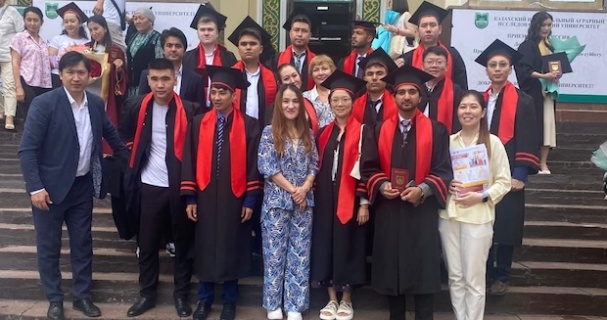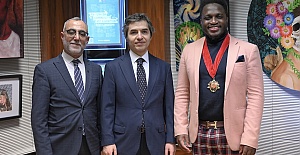AVRUPA TIMES/LONDON-Career change and the value of an MBA. At some point of our life we often think critically about the future and challenges, and benefits associated with a career change. And one of the important considerations - what can be a pivotal factor in facilitating smooth career transition? In order to discuss career change challenges and a comprehensive view of the value of an MBA and business training from both a personal and professional development perspective we invited professor Rafis Abazov, a senior coordinator for the MBA program at Kazakh National Research University (KazNARU) and author of a book “An Effective Project Manager: Your Personal Guide to Strategically Approaching Your Challenges”.
Interviewer: Thank you for joining us today. To start, what factors do we need to take into consideration in a decision to make a career change, and how should people approach this decision?
Interviewee: Any decision to pursue a career change could be driven by many factors but most important - a desire for new challenges and personal growth. There might be a scenario when we realize that while we could be comfortable in our current role, we weren’t fully leveraging our potential or would like to explore something else. Well, we need to develop a strategic vision and conduct a thorough self-assessment (SWOT analysis) to understand our strengths, weaknesses, and passions. I research various industries and roles to identify opportunities that aligned with my students’ skills and aspirations. In addition, networking with professionals in those fields and seeking mentorship were crucial steps that helped them to gain insights and confidence in their decision to transition.

Interviewer: How can an MBA program play a role in facilitating your career change?
Interviewee: The MBA program can instrumental in your career transition. Let’s take an example of MBA at Kazakh National Agrarian Research University (KazNARU). Interviews with many students suggest that it provided them with a comprehensive understanding of different business functions, which was essential as they were sometimes moving into a completely new field. The curriculum covered areas such as finance, marketing, operations, and strategy, giving them the versatile skill set needed to adapt to their new career. Additionally, the program offered specialized courses and electives that allowed them to focus on project management skills that are transferable across many fields. Beyond the academic learning, the MBA also expanded their professional network, connecting them with industry experts, alumni, and peers (such as Coca Cola company, Food masters, Turkish partner companies, etc.) who provided valuable advice and opportunities.
Interviewer: Can you share an example of how the skills acquired during your MBA have been applied in a new career?
Interviewee: One notable example of MBA at KazNARU is when my students led a real life project to optimize a supply chain processes. The operations management and supply chain courses from our MBA program were directly applicable. We used the analytical tools and methodologies learned during the program to conduct a thorough analysis of the current processes, identify bottlenecks, and implement improvements. The leadership and communication skills honed during the course of study of MBA at KazNARU enabled them to effectively manage their project teams and gain buy-in from their key stakeholders.
Interviewer: What challenges did your students usually face during their career transition, and how did your MBA help them to overcome them?
Interviewee: One of the biggest challenges for any person’s career change is building credibility and gaining acceptance in a new place or an industry or a team or a new city. The MBA at KazNARU helped bridge this gap by equipping them with relevant knowledge and demonstrating their commitment to professional development. The program also emphasized soft skills such as leadership, teamwork, and inter-personal communication, which are crucial in any industry. Through group projects, presentations, and case studies, the students developed the confidence to navigate unfamiliar territory and effectively communicate their ideas. Moreover, the strong alumni network and career services provided by the MBA program offered mentorship and partnerships for example, between Kazakh and Turkish companies.
Interviewer: In your opinion, what is the long-term value of an MBA for professionals considering a career change?
Interviewee: The long-term value of an MBA for professionals considering a career change is multifaceted. Firstly, it is in providing a solid foundation in business principles, making individuals versatile and adaptable to various roles and industries. Secondly, it is in developing strategic and critical thinking skills acquired during the MBA study that enable young professionals to tackle complex challenges and drive innovation in their new careers. Third, an extensive network of alumni, faculty, and industry connections very often offers ongoing support and opportunities for collaboration and career advancement. Additionally, an MBA diploma signals to potential employers a commitment to continuous learning and excellence, enhancing one's marketability and competitiveness. Overall, an MBA equips professionals with the knowledge, skills, and network to successfully navigate in domestic and international labor markets.


 Prime Minister Keir Starmer's 2025 Easter message
Prime Minister Keir Starmer's 2025 Easter message After Nesil Caliskan a by-election will be held in Jubilee ward in Enfield
After Nesil Caliskan a by-election will be held in Jubilee ward in Enfield Publishing the analysis, Labour’s Cllr Ergin Erbil said Everybody in Enfield deserves basic rights
Publishing the analysis, Labour’s Cllr Ergin Erbil said Everybody in Enfield deserves basic rights Gaza-Israel conflict Statement from Cllr Ergin Erbil, Leader of Enfield Council
Gaza-Israel conflict Statement from Cllr Ergin Erbil, Leader of Enfield Council The European Union called on Turkey to uphold democratic values
The European Union called on Turkey to uphold democratic values Turkish citizens in London said Rights, Law, Justice
Turkish citizens in London said Rights, Law, Justice The Council of Turkish Cypriot Associations Geneva response letter
The Council of Turkish Cypriot Associations Geneva response letter Sustainable Development and ESG, Will This Become the Course for Turkic World
Sustainable Development and ESG, Will This Become the Course for Turkic World The 'Prince of Paris' has impressed in his first EuroLeague season
The 'Prince of Paris' has impressed in his first EuroLeague season Saran Media And Euroleague Basketball Extend Media Rights Partnership for Four More Years
Saran Media And Euroleague Basketball Extend Media Rights Partnership for Four More Years Will Rangers be Jose Mourinho’s next victim?
Will Rangers be Jose Mourinho’s next victim? Jose Mourinho's Fenerbahce face Rangers on Thursday
Jose Mourinho's Fenerbahce face Rangers on Thursday Barclays has become the biggest UK lender so far to cut mortgage rates
Barclays has become the biggest UK lender so far to cut mortgage rates THE SPRING STATEMENT EXPLAINED, UK ECONOMIC OUTLOOK AND GROWTH FORECASTS
THE SPRING STATEMENT EXPLAINED, UK ECONOMIC OUTLOOK AND GROWTH FORECASTS Launch of Made in Enfield gift shop to celebrate local artists and designers
Launch of Made in Enfield gift shop to celebrate local artists and designers Trial used smart Wi-Fi sensors for live building occupancy data to optimise
Trial used smart Wi-Fi sensors for live building occupancy data to optimise




















Very interesting article, hope that after reading there will be more people who start their study on MBA in KazNARU